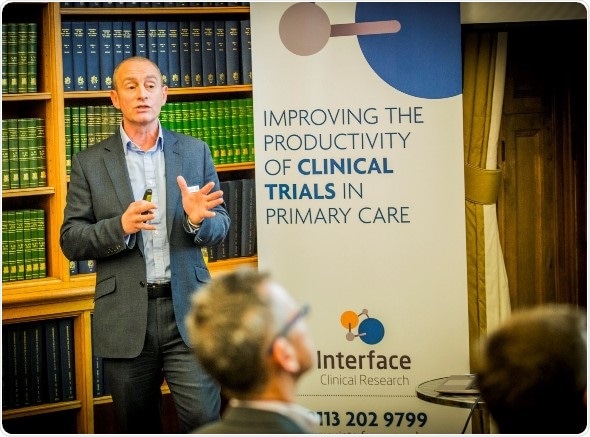Jan 19 2017
New clinical trials company, Interface Clinical Research, outlined a new model for running primary care clinical trials at their launch yesterday at the Royal Society in London. Interface will work in partnership with GP practices across the UK to deliver large numbers of suitable patients for phase III and IV clinical trials. Typically, 48% of sites used in a clinical trial fail to recruit a single patient: Interface believe they have the capability to recruit hundreds of patients per site.

Interface Clinical Research is a division of Interface Clinical Services, the leading independent provider of primary care clinical services in the UK. It has worked in over 3,000 primary care practices, covering more than 41% of the UK population. Interface already has extensive experience in the recruitment and running of hundreds of clinics at GP practices across the UK, on behalf of both pharma companies and the NHS.
Interface’s new model has the great benefit of using existing GP practice facilities, having the trials run by experienced Interface investigators, and working with GPs to offer patients who could benefit from new treatments the opportunity to take part in a trial. Patient retention is a key part of the Interface offering. It already has a sophisticated retention system which has been developed over the last 10 years. Retention will also be improved as patients will take part in trials at a local GP practice.
Mike Drakard CEO of Interface Clinical Research outlined the service:
Working with our GP partners Interface manages the whole clinical trial and is responsible to the sponsor for every aspect, from feasibility through the provision of clinical data. Because we already run hundreds of clinics at GP practices involving thousands of patients, we have developed sophisticated patient recruitment and enrolment systems, including our own in house call centre, supported by a dedicated team who interact with the patients on a regular basis. Unique to the interface offering is the use of clinical pharmacists to see patients, undertake interviews, and oversee any sample collections.
The great benefit of the Interface model is that many GP practices want to be involved in clinical research but don’t have the time. The GP practice can provide the principal investigator, the premises, and oversee the trial process without additional workload. Interface has already identified over 40 GP practices and larger health care organisations that are very keen to become involved in running clinical trials.
This new model offers considerable advantages over traditional ways of recruiting and running trials, using dedicated research centres and individual GPs. The fixed cost of the dedicated research centre is becoming a barrier to offering a competitive service, particularly as they have limited access to large patient databases. The individual GP model has always been inefficient, with 50% of the GPs finding one patient or less, at a cost of over $50,000 per GP for recruitment and training costs. On average, GPs typically only recruit five patients per trial.
Peter Sowood, a leading expert in clinical trials, commented:
This is an extremely exciting development for the clinical trials industry. Involving GPs and primary care practices in clinical trials in this way could dramatically increase the numbers of available patients for clinical trials, as well as boosting the UK’s research capabilities.
Dr Ian Smith, founder of Synexus, commented:
I believe that this new model of using GP surgeries whilst providing all the support of a professional investigator is the next step forward. It provides familiarity to the patient and dramatically reduces the workload and costs associated with standalone clinical trial centres.